Luke 15:1-10 NRSV Sermon begins at 2.54. Below is the transcript. 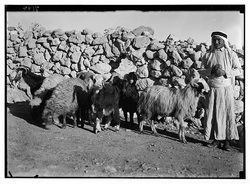 When I think sheep in the bible I first think about the parable for today. I can visualize the Shepherd in my mind, and even if I couldn't, there are dozens of examples of artists who have done the visualization for me. In fact, over hundreds of years, there have been those bold enough to take the parable and place Jesus as the Shepherd who lost the one sheep. A Good Shepherd and Parable of the Lost Sheep Hybrid. I also think about goats. I think about goats because of another parable located in Matthew, the parable of the Sheep and Goats. You know, God separates the people like a shepherd separates his sheep from his goats. The sheep are good because they helped the least of these and the goats are bad because they didn't. There are no goats in today's parable, but I want to connect today's parable using goats. Ready? Here we go! 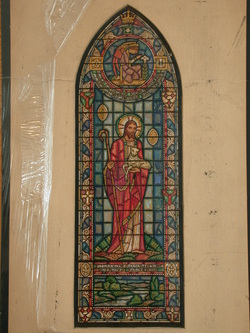 Sheep are adored in the bible. They are mentioned more than 500 times! They are illustrated in icons and other religious images even more than that. When you imagine Psalm 23, what animal do you picture yourself to be when you think of the Lord being your shepherd? I bet most if not all of you think sheep. This is probably because of the Sheep/Goat parable and the multitude of images of Jesus with sheep. Those fuzzy little balls of fluff are loved! They were an agricultural staple to an agricultural people. They gave meat, wool and hide. They were needed to survive. But goats were an agricultural staple too, and easier to care for. While sheep had to be constantly moved to greener pastures, goats were accustomed to the rough landscape and could eat almost anything. They took less maintenance and gave just as much product. Milk. Hide. Meat. Why would Jesus use the goat to illustrate bad choices? I blame Azazel. 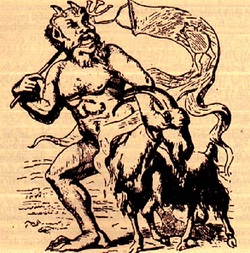 Who is Azazel? Back when the Israelites lived in the wilderness they were having issues following rules and staying away from sin. (I know, right? The group who made a graven image of a cow because they were impatient had a problem keeping up with the rules. Crazy, I know.) Well, they did. This scared them because they saw God as a vengeful god, punishing to the third and forth generations. It would be centuries before a prophet would come and tell them this wasn't the case, so God gave them an opportunity to wash away the sin. It was called the Day of Atonement, or Yom Kipper. In the beginning Aaron, being the head priest, would sacrifice a bull for himself and would set aside two goats for the Israelites. One of the goats were sacrificed with the bull and the blood was used to purify the temple. The other goat was given to Azazel. This was done by ritualistically placing the Israelite sin on the goat and sending it out in the wilderness for the demon, Azazel, to consume. In Hebrew Azazel means something like, “the goat that escapes.” Therefore, the term scapegoat was coined. The person who was chosen to release the goat into the wilderness would have to clean up and change clothes before they were allowed back into society. Now, there is nothing wrong with ritual and using it to help us understand God and our life better. The original context of the scapegoat was made for such a process. The problem comes when the ritual becomes something more than a ritual. Or in other words, when the scapegoat goes from being a goat to be an actual person. The thing that is so alluring about the scapegoat is the sinner doesn't have to accept the consequences for their sin. They can symbolically place their sins on something else and send it out in the wilderness, never to be heard from again. Then, their hands are washed of it all and they can move on with their lives. As a ritual, this can be a really poor symbol for personal accountability, but at least no one person is punished for the sins of others... 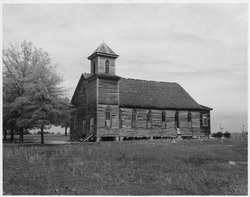 But I think the scapegoat has taken on a more sinister role as the ritual has died away, but the need to “throw-away” sins remains. In recent history I think of the Jews during the Holocaust After WWI the Germans were economically destroyed. The only group that appeared to be unaffected were the Jewish business owners. All of Germany held the blame, but it wasn't difficult to begin to set up the Jews as the scapegoat. We all know where that led. In very recent history I think of the desperation the church has felt as their numbers have dwindled, and many congregations have begun to point fingers to lay blame. In many of these congregations, instead of accepting their failures and turning the page on a new chapter, they pick one of their own to lay the blame on. They make a scapegoat out of someone within the flock. They lose a few congregants and can continue down the same path. So here is where I get to the parable. First, there are no goats. In this parable the shepherd only has sheep: needy, time consuming sheep. They are all the same, all loved and cared for. Second, even if there were goats it is not the flock's responsibility to separate them. It is only the shepherd who decides who to separate the flock. Third, we try to do it anyway, and we tend to do it by turning a sheep into a scapegoat. The scapegoat was never meant to be one of our own. When I hear the parable of the lost sheep I can't help but think of how that sheep became lost. It seems in today's churches we are sending our own into the wilderness as the scapegoat. It is appears it's easier to feed the demon Azazel, that to actually deal with problem. To feed one another instead. This belief is false. We are sacrificing one of our own for the sake of the whole, only we are crippling the whole in order to do it. 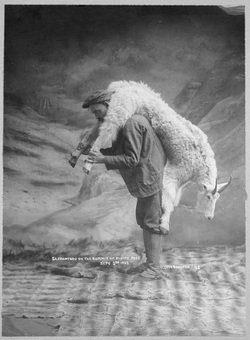 OK, so what I am about to say is going to sound really traditional, but I'm going to go about it in a non-traditional way. We live in a world where we willingly sacrifice one of our own for our own well being. So, it is the collective us who causes the one to be lost in the wilderness. We turn a sheep into a scapegoat. Well, based on the parable, the shepherd is going to try to bring the lost sheep back into the fold. Here is the problem: There is only one way to redeem a scapegoat. To redeem a scapegoat, one must take the scapegoat's place. Christ died for all our sins by taking the place of the one: Any ONE we have chosen to put our sins on to avoid relationship, if they are found Christ takes their place. Any ONE we have othered and sent into the wilderness, if they are found Christ takes their place. And, it's in taking their place, releasing them from the unbelievable burden Christ dies and redeems all. The Good Shepherd becomes the ultimate scapegoat, feeding the thirsty cravings of Azazel. Christ took the place of all of us who have been othered and pushed into the wilderness. Christ took the place of all of us who carry the unhealthy burden of the sin of the community. And, whether we are the ones washing our hands of the act, or the ones who Christ is taking the cross from, that act saves us all. Like what you are reading? Join the conversation on Reddit! http://www.reddit.com/r/FigTreeChristian/ . There you can also share blogs and articles that extend the discussion, or just add to the discussion on this meditation. Either way, look forward to seeing you there!
Also, if you are in the Atlanta area consider coming to the planning on Sunday, October 6th . For more information check out Upcoming Events! |
Categories
All
Archives
October 2023
|



 RSS Feed
RSS Feed